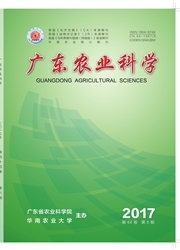

 中文摘要:
中文摘要:
为了解广东南雄烟区土壤的退化情况,共调查了8个村的54个农户,种植面积431.2km2,其中包括旱地紫色土103.4km2,牛肝土水田109.4km2,沙泥田水田75.4km2,平均产量为244.4kg/km2。牛肝土水田和紫色土上种植的烟叶质量和产量高,连年种植烟草的沙泥地容易高发青枯病。产量高的地块施肥相对较多,但未呈现正相关关系。采集了土样并进行土壤微生物分析表明,土样间细菌、真菌和固氮菌的种类、数量有很大不同,即可培养微生物群落的差异非常大。烟田种大豆的土壤细菌和固氮菌数量最多。轻发青枯病田块土壤真菌数量最多,但其患青枯病烟杆的根际土真菌数量很少,根际土硝化细菌多。不同土壤固氮菌使碳酸钙溶解的情况也不一样。
 英文摘要:
英文摘要:
In order to study the status of soil degradation in the tobacco-planting fields in Nanxiong of Guangdong province, 54 farmers from 8 villages, whom totally planted 431.2 km2 tobacco, were investigated, which involved 103.4 km2 Purple soil, 109.4 km2 Niugantutian soil and 75.4 km2 Shanitian soil, and the average yield was 244.4 kg/km2. The results indicated that the tobacco output and quality were relatively higher in the Niugantutian and Purple soils. The tobaccoes planted in the continuous planting Shanitian soils were easy to be infected by Ralstonia solanacearum (bacterial wilt), meanwhile, the fertilization was more in the high-yield fields, but the relationship between them was not significantly correlated.In addition, soil samples were collected for studying the soil microbes.The figures indicated that the amounts and populations of bacteria, fungi and nitrogen-fixing bacteria were obviously different, namely the community diversity of the culture-dependent microbes is different. The bacteria and nitrogen-fixing bacteria amount were the most in the soybean and tobacco rotation field, and most for the fungi in the fields of slightly-infected by Ralstonia solanacearum, however, the fungi was less in the rhizosphere of tobaccos infected by Ralstonia solanacearum.Nitrobacteria amounts were more in rhizophere soil than in non-rhizophere soil.The abilities of dissolving CaCO3 were also different for the nitrogen-fixing bacteria form different soils.
 同期刊论文项目
同期刊论文项目
 同项目期刊论文
同项目期刊论文
 Diversity and high nitrogenase activity of endophytic diazotrophs isolated from Oryza rufipogon Grif
Diversity and high nitrogenase activity of endophytic diazotrophs isolated from Oryza rufipogon Grif 期刊信息
期刊信息
